"If they tell me: What you do is not poetry, I answer them: Indeed, you are right, I suspected it long ago, and now I know it for sure, I will arrange myself accordingly."
"It's not me singing, but the flowers I saw. It is not I that laugh, but the wine I have drunk. It is not I who cry, but the love I have lost." - Jacques Prevért
One of the most important French poets of the 20th century, screenwriter and artist Jacques André Marie PRÉVERTwhose 125th anniversary we are now commemorating, is known not only for his poetry, which is still appreciated for its humanity, its ability to capture the beauty of ordinary life and its criticism of social conventions, but also for his film scripts. In addition to literature and film, his work also influenced theatre, songwriting and the visual arts. For children he wrote a set of short stories with animal characters Fairy tales for unworthy childrenthat are out of the ordinary for children's literature. His poetic collages are often full of the symbols, absurd combinations and black humour so characteristic of his world view. "If you can't draw, you can make pictures with glue and scissors," he claimed.
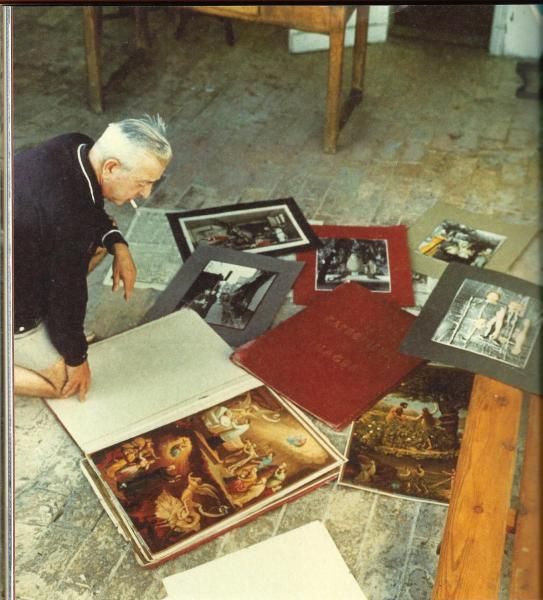
His most famous collection Words (Paroles, 1946) became one of the most widely read French poetic works of the last century. Film Children of Paradise (Les Enfants du Paradis, 1945), for which he wrote the screenplay, is considered one of the best works of French cinema of the 1940s. The three-hour film deals with the life of the famous Parisian actor-mime Jean-Baptiste Deburau. Prévert's lyrics have been set to music and humanised by the performances of famous chansonnier singers such as Edith Piaf, Marlene Dietrich, Yves Montand and Juliette Gréco. He is often seen as a "poet of the people", but his work has a deep philosophical dimension and timeless value.
He was born on 4 February 1900 in Neuilly-sur-Seine, a suburb of Paris. He was the middle of three sons of André Prévert and his wife Marie née Catusse. His brother Jean, two years older, died of typhus in 1915. The younger Pierre, born in 1906, became a film director, screenwriter and actor, and most importantly a collaborator of Jacques.
Their father worked for the Central Office for the Poor in Paris and often took Jacques with him when his work took him into the proletarian quarters of the city. These experiences led to the poet's lifelong sympathy with poor people and social sensibilities. His father also wrote theatre and film reviews for local newspapers and often took his sons to the theatre or cinema. Their mother, a former shop assistant at Les Halles in Paris, in turn encouraged them from a young age to read and love literature.
Jacques attended a private Catholic school, which he disliked because it contradicted the dogmas taught. He was more of a truant than a model student, and as soon as he finished his primary education he left school. He certainly did not expect generations of French students to recite his verses, which would appear in French language textbooks published around the world, and some 400 schools in the country would bear his name.
His autobiographical prose Childhood is full of happy memories of wandering the boulevards of Paris, of street performers, singers and clowns. He was proud to be a "street kid". His rebellious spirit later manifested itself in a satire of the rigid French education system and the Catholic Church.
"One laments the consumer society, but this leaves me cold against a society that consumes ideas, this leads to the true degeneration of man."
At the age of 15 he began working in the department store Le Bon Marché, and at 18 he was forced to join the military. In 1921 he was posted to the Middle East, to Constantinople (now Istanbul), occupied by Allied forces since the end of the First World War. There he met the future publisher Marcel Duhamel.
In 1922, he returned to Paris, where he supported himself with odd jobs and began to collaborate with the Surrealist movement alongside the writer Raymond Queneau and M. Duhamel. However, he was too independent and free-spirited to join any organized group.
With the painter Yves Tanguy, he frequented the bookshop of the famous publisher Adrienne Monnier, who introduced them to figures such as André Breton and Louis Aragon. However, Prévert eventually broke with Breton. For four years from 1924, he stayed with Duhamel in his apartment near Montparnasse, where a group of their misfit friends, surrealists such as Queneau, Tanguy, Breton and Aragon, met. Duhamel ran his uncle's hotel and financed everything.
In April 1925, Prévert married his childhood friend Simone Dienne, who as a cellist had provided musical accompaniment for silent films in the cinema. In 1928, the couple settled in Montmartre and Jacques began writing his first poems.
In 1929 he made his magazine debut with a poem A little decency or The story of the manatee fish, but he was more attracted to theatre and film. He became a member of the left-wing group October (Octobre), an avant-garde workers' theatre, and wrote short plays, sketches, farces and monologues for actors on topical themes, often denouncing capitalism. Between 1932 and 1936 the group was very active, performing in striking factories (Citroën), at demonstrations, in the streets and even in bars. It was a great success in the country and, together with Prévert, was invited to the Soviet Union in 1933 to perform a play at the International Workers' Theatre Olympiad in Moscow Battle of Fontenoyin which she mocked the politicians and warmongers of the time. Before returning to France, they were to sign an appeal with words of gratitude to Stalin, but Prévert refused and his authority was so great that the whole group, which included members of the French Communist Party, followed him.
Prévert collaborated with Louis Aragon, who headed the cultural department of the Communist Party's central committee, but was not involved in politics. As much as he loved freedom, he hated authoritarianism, violence and hypocrisy of any kind, chauvinism and bureaucracy. Salvador Dalí remarked: "Jacques fights the evil he hates not with bombs but with firecrackers." Prévert remained a supporter of the left throughout his life. In 1971, he wrote a poem in support of the American communist and peace activist Angela Davis after her arrest.
After the break-up of the band October, Prévert's collaboration with film began in earnest. He wrote film scripts and became a true master of film dialogue. From 1935-45, he worked on the now classic films Embankment of mists, Gates of Night, The day begins, The Lovers of Verona, The bell tower from the Mother of God, A visit from the darkness or Children of Paradise. With his brother Pierre, he also made several short films and adapted two Andersen fairy tales into animated films. Shepherdess and chimney sweep a Tin soldier. He managed to combine poetry and cinematography in a documentary film Seine meets Paris. The film won the Palme d'Or at the 1958 Cannes Film Festival.
In 1935 he divorced his wife Simone, the following year he had an affair with the actress Jacqueline Laurent, then with the fifteen-year-old actress Claudia Emanuelli, known as Claudy Carter, and finally in 1943 with the dancer Janine Fernande Tricotet, whom he married in March 1947. In November 1946, their daughter Michèle was born. Granddaughter Eugénie Bachelot-Prévert, barely three years old at the time of Prévert's death, now administers her grandfather's estate.
After Nazi Germany invaded France, Prévert moved to Saint-Paul-de-Vence near Nice in the south of France in 1940. During World War II, he helped his Jewish friend Joseph Kosmas, a composer who set his lyrics to music in 1935. Performed by famous chansonnier singers, the songs captivated audiences in Paris cabarets. All pop stars at the time had songs with Prévert's words in their repertoire. The highlight of Edith Piaf's programme was his Dead leaves; in 1954 Yves Montand was awarded the Golden Disc for the same song on the occasion of the sale of the millionth copy of this record. Prévert also wrote several plays and puns for small theatres.
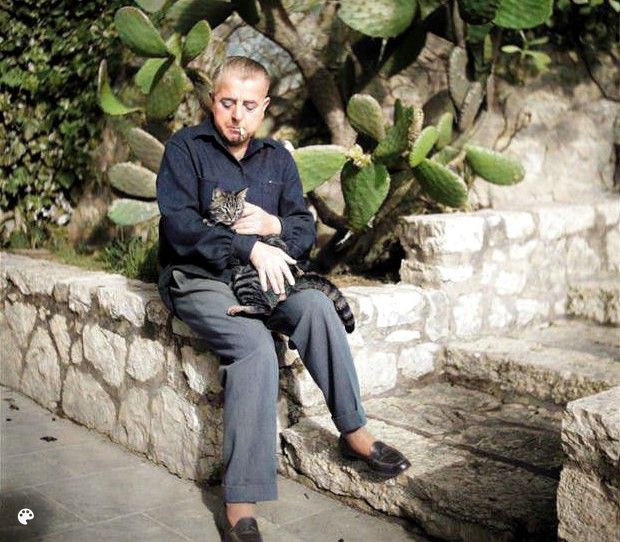
As a poet, he did not become famous until he was forty-six. Until then, nobody knew his poetry except his many friends. He was famous for writing his poems on scraps of various pieces of paper, café receipts, etc., and handing them out to friends on a whim, so when the publisher René Bertelé decided to publish them, his job was not easy. But the result was worth it. Collection Words (Paroles) was a bombshell, the critics were enchanted by the new method of literary collage, and the readers by the language they understood. Prévert likes to juxtapose seemingly illogical images, details and direct speech, large compositions and short pop songs, unexpected connections, jokes, symbols, paradoxes, absurdities, small incidents in the lives of ordinary people, random rhymes and urgent messages. To date, this 250-page book has had a total print run beyond the author's wildest dreams - three million copies!
After the publication of his collection, he became an honorary member of the Collège Pataphysique, founded at the instigation of Alfred Jarry, the founder of pataphysics and modern drama. His beloved dog, a Briard named Ergé, was elected satrap of the College in May 1953, at the same time as his master.
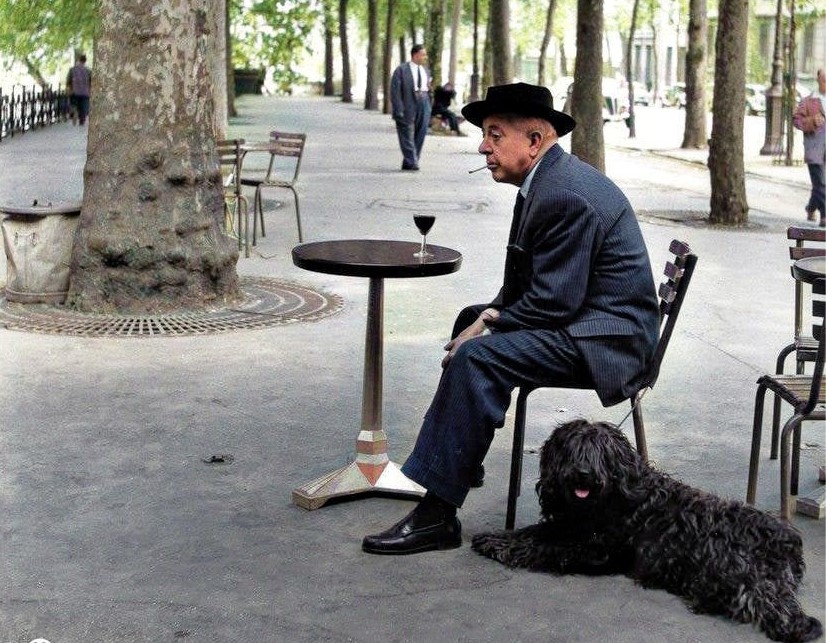
In October 1948, Prévert suffered a serious injury when he fell out of an unlocked French window on the second floor of the Radiodiffusion Française offices because the Germans had removed the railings during the occupation to install a machine gun. Prévert suffered a fractured skull and his life was in danger. He was in a coma for ten days and recovered for several months, but irreversible neurological effects remained. When he returned home, to avoid losing his insurance claim, he stopped writing and ended his film commitments. He turned to collages, another form of poetry, and began making cartoons and children's films with his brother.
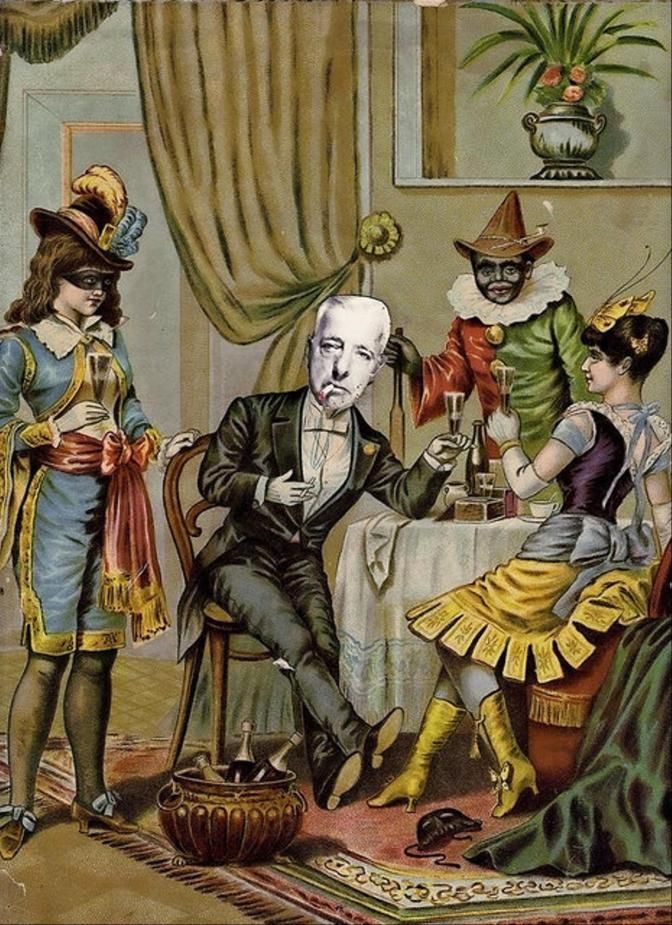
He didn't give a shit about his career. He loved Paris, he loved life, he was an excellent observer, his great love was nature. He would rummage through flea markets, search shops for early century lithographs, old prints, Epinal pictures, advertising vignettes. He gathered all the material that spoke to him and made collages, which, like the poems before them, he gave to friends or gallery owners with a personal dedication. Some he hung on his walls at home, some he put away in drawers, not thinking about the fact that he was creating a work of art. He often visited his friends, the painters Picasso and Miró, designers and photographers, illustrators.
In 1957, he exhibited a series of collages for the first time at the Maeght Gallery, followed by the Grimaldi Museum in Antibes in 1963 and a year later by the Knoedler Gallery in Paris, which presented one hundred and twelve collages from Prévert's personal collection and those of his friends Picasso, Bertelé, Duhamel, Villers and others. His collages were so well integrated into his poetic output that he published 57 of them in the collection Fatras (1966) and 25 in Imaginaires (1970).
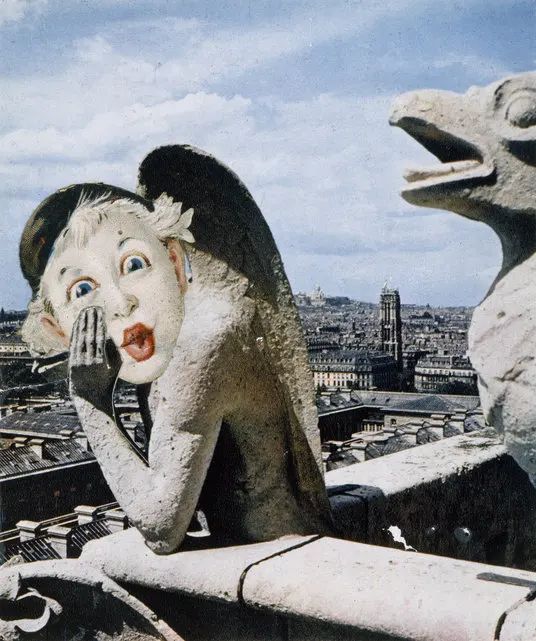
Jacques Prévert lived for a long time in furnished apartments and hotels before settling in Paris in 1956 in an apartment at the end of a cul-de-sac behind the Moulin Rouge. The Prévert family's second home was the seaside town of Antibes, but they left it when the landlord ended the lease, mainly at the request of his wife, who was trying to distance her husband from the "temptations of a dissolute life". In 1971, they bought a house in the village of Omonville-la-Petite in Normandy in north-western France. Prévert spent the last years of his life there. He died of lung cancer on 11 April 1977. He smoked three packs of cigarettes a day and always had one in his mouth. He was 77 years old.
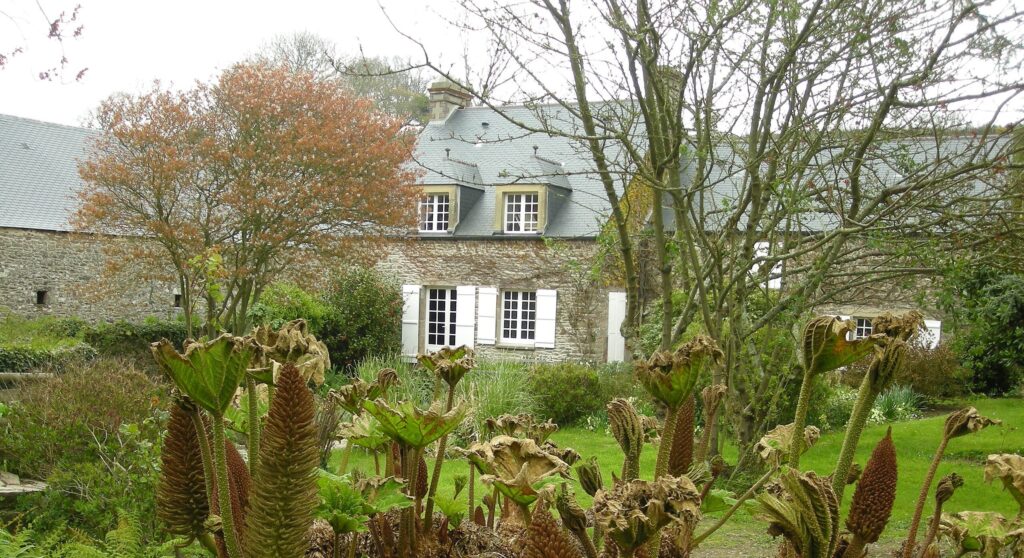
Together with his wife and daughter, he is buried in the local cemetery and his house with an exhibition of collages can be visited in the village. Nearby, in Saint-Germain-des-Vaux, his friends have created a garden dedicated to the poet.
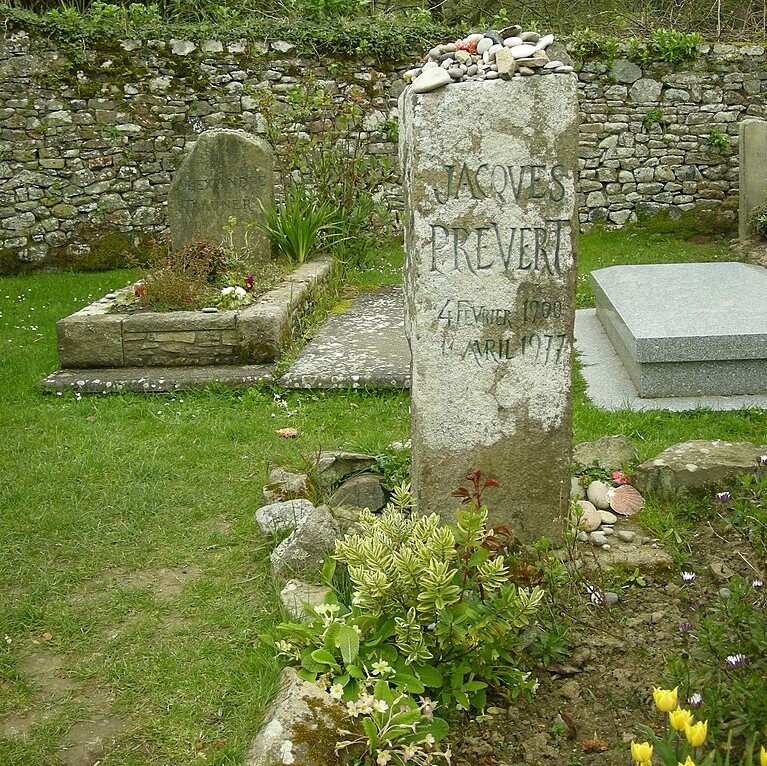
A selection of Prévert's poetry was published in the Czech Republic as early as 1958. The authors of Czech translations of his works were most often Karel Sýs, Marie Bieblová, František Hrubín, Petr Skarlant and Jiří Žáček.
Wikipedia/ gnews.cz - Jana Černá



